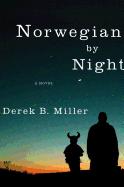
Complex, layered and utterly original, debut novelist Derek B. Miller's Norwegian by Night is one of the most surprising and unusual novels to emerge in recent years. While there are always exceptions, a certain homogeneity has overtaken suspense novels of late, especially those set in Scandinavia. The landscape, both internal and external, is oppressive, dark, and relentlessly unforgiving. The protagonists of these novels tend to be predictable as well; brooding, troubled types on a mission who seek to reconcile their pasts while solving crimes. While Norwegian by Night has a great deal of tension and suspense, it cannot easily be classified as a thriller. And while it offers a unique insight into the country and character of Norway, it is of a very different type than such Norwegian writers as Karin Fossum or Jo Nesbø. Moreover, Sheldon Horowitz, as unusual a character to ever carry a novel, bears no resemblance to the kind of hero we've come to expect. It is to Miller's great credit that he has managed to retain all the elements of a first-rate Scandinavian thriller while turning the genre--and our expectations of it--on its ear.
The plot is deceptively simple. Octogenarian Sheldon Horowitz, a recently widowed watchmaker and Korean War veteran from New York City, has moved to Oslo with his granddaughter, Rhea, and her new husband, Lars. It's a tenuous situation--Sheldon feels out of place both as an American and as a Jew in Norway, where the Jewish population tops out at about 1,000 in a country of roughly five million people. Sheldon's son, Saul, was killed in Vietnam before Rhea's birth and her indifferent mother left the baby with Sheldon and his wife to raise. Sheldon blames himself for Saul's death (a complicated subplot that is revealed in careful increments through the novel) but he finds hope in the prospect of a new generation; Rhea is pregnant. For her part, Rhea worries that her grandfather may be suffering from dementia and when she miscarries at the beginning of the novel, she fears the news will send him over the edge. At this point, the novel takes one of the many left turns that keep the reader engaged and guessing. While Rhea and Lars are out, Sheldon witnesses the brutal murder of his upstairs immigrant neighbor, a Balkan woman whose six-year-old son hides from the attacker. Haunted by war and loss and increasingly merging fantasy and memory with reality, Sheldon decides the safest thing to do is to go on the run with the boy, who speaks no English and remains mute for the entire novel. Given Sheldon's age and dubious mental state, it seems unlikely that this odd pair will get very far, but Sheldon is sharper than his granddaughter (and, indeed, the reader) thinks. Despite being penniless, not knowing the language or geography of Norway, and unable to communicate with his new charge in anything but gestures, Sheldon manages to elude his family, the police, and the killer in short order.
Once Sheldon escapes, the novel splits into four points of view that crisscross each other throughout the novel, ultimately converging in a small summer farmhouse in the countryside. The first is that of Rhea and Lars, whose new but respectful and loving marriage Miller describes with wonderful economy and subtlety. Through Rhea we also learn more about Sheldon's past, the softer side that he is unable to reveal, and the depth of his devotion to his granddaughter. Then there is Chief Inspector Sigrid Ødegård, the steely, dry-witted but highly intuitive detective in charge of the murder case, who, along with her equally dry partner Petter, offers a native's insight into Norway. Sigrid quickly figures out that the crime is connected to an Albanian war criminal, Enver, whose rape of the dead woman during the war in the Balkans produced the child whom Sheldon is hiding. Enver, chilling, single-minded, and almost casually evil, is the third point of view in the novel. Through him, Miller offers readers a window into the ability of war to warp, twist, and destroy morality. Finally, there is Sheldon himself--irascible, melancholy and possessed of a razor-sharp ironic wit--whose desire to right the wrongs of his past, both real and imagined, drives him and the boy on their increasingly dangerous journey.
Merging themes, viewpoints, and even genres in one compact novel, Norwegian by Night could easily have been twice as long without risking reader fatigue. Yet part of the deep satisfaction of this affecting book is Miller's ability to carefully build his scenes and dialogue with multiple layers of meaning. The story is moving yet never sentimental, intricate yet effortless. Miller takes readers down many paths, commenting thoughtfully on war, family, country, identity and the personal as political, yet never loses the tension or propulsion of his story. Thought-provoking, evocative, and wry in the best way, Norwegian by Night is a remarkable novel. --Debra Ginsberg, author

